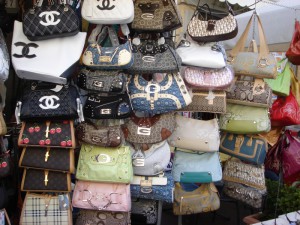Jail Time for Buying Knockoff Merchandise?
There are plenty of things that attract visitors to New York City: Broadway, museums, national landmarks, fine dining, and perhaps above all, shopping. New York is pretty much the fashion capital of the U.S.
Many luxury goods, especially designer clothing, come at very high prices (thousands of dollars for a handbag, for example). And it should be obvious that such prices are not required in order for the companies to earn a profit. The materials and labor involved in producing a handbag cannot possibly be that expensive.
So, what drives the price up? The brand name. Famous brands, like Gucci and Louis Vuitton, command such high prices because they are associated with status. The high price is actually part of their value: it tells the world that its owner can afford to spend a few thousand dollars on a purse.
There’s absolutely nothing wrong with this. I certainly don’t begrudge these companies their success, and the people who buy their products can spend their own money however they like. It is an interesting quirk in human nature, however.
Anyway, it should come as no surprise that some people want the status afforded to them by a luxury brand, but don’t have the money to buy it. And when there’s a demand for a product, there’s going to be someone to supply it. Enter the counterfeiters. There is a thriving underground (well, it’s not always that underground) market for counterfeit luxury goods, sometimes virtually indistinguishable from the genuine article, sold at a fraction of the price. Designer clothing and accessories are some of the most popular counterfeit products. New York is one of their major centers of operation.
 There are already federal criminal laws against importing counterfeit goods. Plus, federal trademark law gives the producers of the original item extensive civil remedies against counterfeiters. But, for at least one member of the New York City Council, that’s not enough.
There are already federal criminal laws against importing counterfeit goods. Plus, federal trademark law gives the producers of the original item extensive civil remedies against counterfeiters. But, for at least one member of the New York City Council, that’s not enough.
That’s right, there’s a proposed law (.PDF) in New York City that would make it a crime to purchase an item that the buyer knows or should have known to contain a counterfeit trademark, punishable by up to a year in jail and/or a fine of up to one thousand dollars.
I’m all for protecting trademark rights. A strong system of trademark protection is good for business, and it’s also good for consumers. It allows businesses to protect the integrity of their brands, and prevents others from taking a free ride on the business goodwill that trademark owners have worked so hard to build up over the years.
It protects consumers by making it more difficult for companies to mislead consumers by identifying their products as the products of a better-known company, with a better reputation than their own. It therefore protects consumers from fraud.
However, this new law doesn’t really comport with the “consumer protection” angle of trademark law. After all, it specifically punishes consumers for buying counterfeit products. If a consumer has been fleeced into buying a fake Gucci handbag, certainly they shouldn’t be punished. And, if they know that they are buying a fake, they aren’t being misled or defrauded, so obviously this law is not meant to protect consumers.
I suppose one could argue that, by targeting the demand side of trademark infringement (as opposed to the supply side), fewer counterfeit goods will be produced, making it less likely that other, less-savvy consumers, will be misled into buying bogus knockoffs.
This is certainly a valid concern. However, because of the language in the law that criminalizes buying an item when the buyer knows, or should have known that it was fake, there’s a good chance that a person who honestly didn’t know that they were buying a fake (maybe they were simply naïve about the workings of the fashion industry) could end up facing criminal liability because a jury decides that they “should have known.”
Granted, given the standard of proof involved in criminal cases (guilt must be proven beyond a reasonable doubt), this is unlikely. But it’s not difficult to imagine a set of circumstances in which it’s possible.
Also, as I mentioned earlier, trademark law doesn’t exist only to protect consumers. It also protects business interests, and trademark law is one of the few areas I can think of where the interests of businesses and the interests of consumers mesh almost perfectly (though not quite perfectly, in some cases).
This law definitely seems to favor the “protecting businesses” aspect of trademark law, even though it may protect some consumers indirectly. Now, there’s nothing wrong with protecting the legitimate rights of businesses. And trademark rights are perfectly legitimate, in my view. But, should we go so far as to imprison people who buy knockoff goods. Chances are, those people wouldn’t (and couldn’t, in any case) have bought the genuine article at full price, if the knockoff were unavailable.
Of course, lost sales aren’t the only concern. If a knockoff looks like the real product at first glance, but is so cheaply made that it falls apart after a few weeks of use, that’s going to hurt the image of the manufacturer of the real product, not the counterfeiter.
But, the impact of that is likely to be minimal, and certainly not enough to justify putting people in jail.


Comments